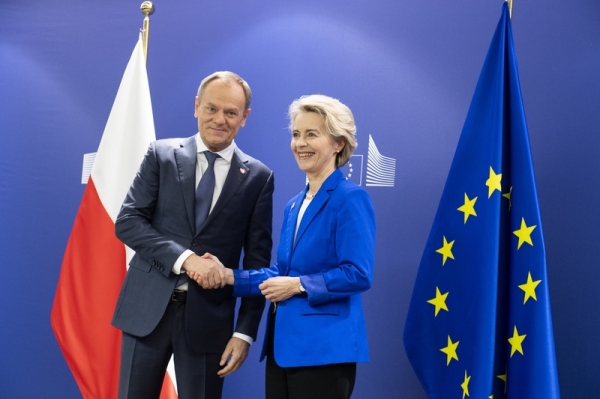Tusk’s Poland still has a lot of work to do on rule of law
After eight years of continuous degradation of the rule of law and systemic attacks on democratic standards and human rights under the previous Polish government, the prospect of a democratic renewal under Donald Tusk elicits a certain excitement.
Enthusiasm aside, however, and with all due consideration for the pledges made by Tusk, the commitment and, even more so, the ability of Warsaw’s new executive to restore the rule of law in Poland has yet to be put to the test.
As they welcome with open arms Tusk and his government back into the ‘EU family’, the EU institutions should remain vigilant about what such commitment means and how it will play out in practice.
Poland is still under scrutiny by the EU executive for repeated rule of law breaches under the previous government, including under the well-known Article 7 procedure, the mechanism by which the EU can hold member states accountable for violating its core values.
Infringement proceedings are also still pending, and numerous decisions by both the European Court of Justice and the European Court of Human Rights remain unimplemented.
Far from being outdated or unfair, these proceedings are part of the necessary political accountability and responsibility elected governments must assume when taking office with a vow to ensure compliance with EU values. It would be unwise to use the recent political turnover as a pretext to relax the pressure on Poland, and to overlook the democratic challenges that the country is facing, by underestimating the obstacles that the new leadership will need to overcome to bring about change and the consequences that too quick an overhaul could have on the system.
The country is not out of the woods yet.
’Packed with political appointees’
The damage done to EU values over eight years of PiS (Law & Justice) rule is profound and far reaching. The judiciary — including the Constitutional Tribunal — and the prosecution service, still under control by the executive and packed with political appointees by the former government, need urgent reform.
Restoring their independence and doing away with the politically controlled National Council of the Judiciary is vital to re-establishing democratic checks and balances and the rule of law in Poland. Reinstating respect for constitutional standards and review is another crucial step, without which the travesty of legality put in place by the Law and Justice government will continue to play its effects into the new legislature, as the recent scandal concerning former heads of the national anti-corruption authority Maciej Wasik and Mariusz Kaminski has shown.
Indeed, in no democracy worth its name the president of the republic, who supposedly should act as a guardian of the constitution and the respect of the law by other public institutions, would dare to question a court’s judgement and exonerate a convict before their case has been adjudicated by the country’s courts.
The obstruction by PiS-supported president Duda against any action undertaken by the newly elected government represents a major obstacle standing in the way of genuine reform.
By retaining veto power over any law passed by parliament, the president can, in fact, effectively block any attempts by the parliamentary majority to reform the system and prevent any democratic advances in Poland.
Yet, there are grounds for hope.
The new minister of justice, former ombudsman Adam Bodnar, recently issued several statements addressed to national courts reminding judges of the importance of upholding European and international legal standards.
In addition, the judgments passed by the Constitutional Tribunal are now published with a caveat stating that, whenever a judge not legally-appointed sits in the panel, the tribunal does not fulfil the criteria to be considered as an independent court of law.
The new government has also committed to re-establishing respect for the primacy of EU law, by promptly and fully executing the decisions of both the Luxembourg and the Strasbourg courts, thus proving its intent to make the relationship between Warsaw and regional rule of law and human rights protection systems work.
The Polish government also manifested its intention to strengthen the cooperation with the European Anti-Fraud Office (OLAF) and the European Public Prosecutor’s Office, by stating that it will be joining the latter — a decision warmly welcomed by the EU.
After years of strained cooperation, this could bring a drastic change to the Polish government’s approach to these institutions and step up Poland and the EU’s joint efforts to fight large-scale public corruption and ensure accountability for financial crimes against both the state and the EU budget.
These are promising steps for the restoration of the rule of law in Poland and the future relationship between Warsaw and the EU.
However, in order to bring about real change that would restore Polish democracy and ensure compliance with commonly agreed standards and values, the EU must demand that any reform process take place according to a clear, timed and mutually agreed roadmap, negotiated in the context of ongoing proceedings.
The financial argument could also be further leveraged by holding back from releasing any funds from the EU post-pandemic recovery plan to Poland pending the fulfilment of a number of pre-set rule of law targets, and by enforcing rules making EU financial support across areas conditional upon respect for the rule of law and fundamental rights.

